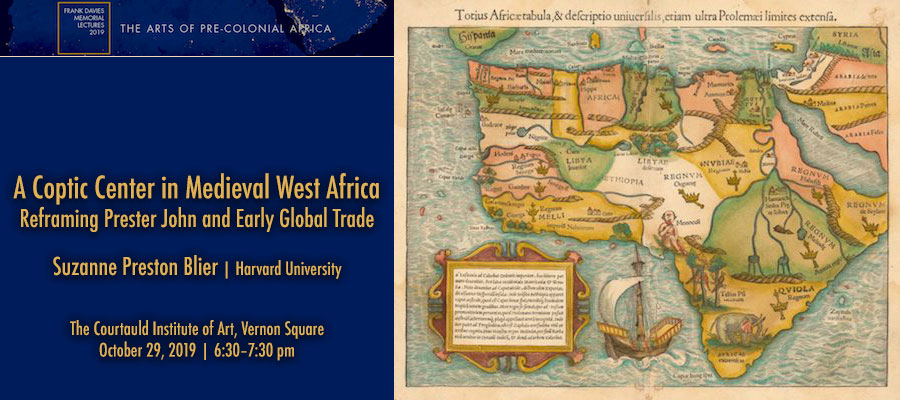A Coptic Center in Medieval West Africa: Reframing Prester John and Early Global Trade, lecture by Suzanne Preston Blier (Harvard University), The Courtauld Institute of Art, Vernon Square, October 29, 2019, 6:30–7:30 pm
This paper explores the importance of new technologies in the art historical study of Medieval West Africa and how related methodologies both help us understand the important art and architectural landscape here in this period, and how Africa and the eastern Coptic Christian world helped to reshape Africa in this era. A key focus of this discussion are various art historically rich sites in West Africa (Ife, Hausa, Bornu, Mafa), in Nigeria, Cameroon and Chad and how they may relate to the larger African European diaspora. At the same time this paper will also take up the importance of new technologies such as GIS, DNA, and geological analysis in addressing these and other issues are important to understanding the broader role that economy, trade, and religion have played in these and other contexts. This paper accordingly takes up the relative merit of new and older technologies in contexts where other data such as written resources are largely missing. While my focus is on medieval African art scholarship, the implications clearly are broader. I will argue that both quantitative and qualitative analysis can, in different contexts, offer unique insight into core art historical questions. Specifically, I will draw on vital differences in formal analysis, material analysis, GIS, DNA, environmental analysis.
Suzanne Preston Blier is Allen Whitehill Clowes Professor of Fine Arts and of African and African American Studies, Harvard University.
This lecture is the second Frank Davis Memorial Lecture of 2019. The 2019 Frank Davis Memorial Series invites four distinguished speakers to share new research in African art before the continent-wide colonialisation of the nineteenth century. Looking at the African material on its own terms rather than in light of Europe while also allowing us to understand the intercontinental and wider networks: the ways in which its various kingdoms centred themselves and connected with cultural worlds beyond. These lectures vary in scope and in their methodological approaches and provide an opportunity for reevaluations of the history of African arts.
Advance booking required.
